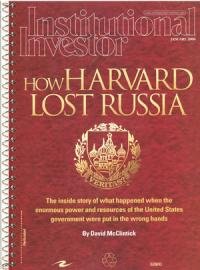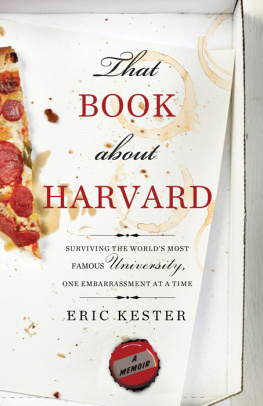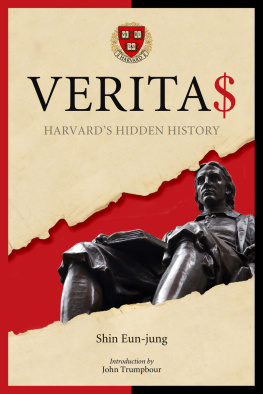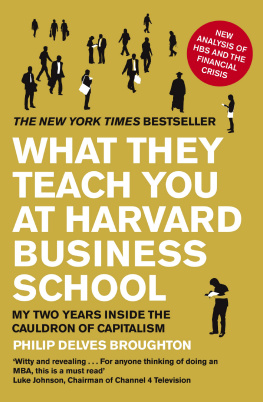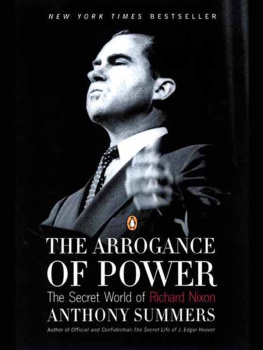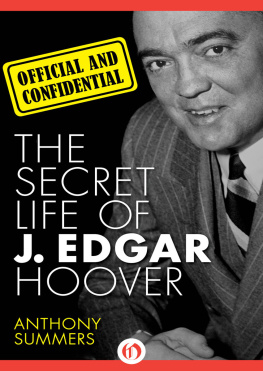O n the afternoon of Friday, the twelfth of October, 2001, Harvard University prepared to swear in its twenty-seventh president. It was a glorious Indian summer day, almost too warm for the fall, when Harvards hometown of Cambridge, Massachusetts, is marked by crisp, cool air and the soft, fractured sunlight that hints at the imminence of winter. With every breeze, a reporter for Harvard Magazine would later note pleasurably, a gentle rain of golden locust leaves showered down on the seated assembly.
Some five thousand spectators were happily milling around Harvard Yard, the historical and emotional heart of Harvards campus. The women wore sundresses or slacks. The men took off their sport coats and their blue blazers and rolled up the cuffs of their sleeves. The students were clad in the jeans and shorts and T-shirts they normally wore. Students, parents, alumni, professors, journalists, and politiciansall had come to witness this unusual transfer of power. The ritual didnt take place very often at Harvardonly five times in the twentieth centuryand, about this new president, there hovered a buzz of excitement and curiosity, and more than a little anxiety.
This would be the first new president of the twenty-first century, and how much the world had changed, how fast, since the happy-go-lucky, all-is-right-with-the-world days of the 1990s. In normal times, anyone could stroll into Harvard Yard through one of its myriad wrought-iron gates. But on this day, police had set up checkpoints and rifled through the visitors purses, briefcases, and knapsacks. One cop was walking a bomb-sniffing dog on a leash. Police officers stationed at regular intervals kept a close watch on the crowd.
Only a month had passed since the terrorist attacks of September 11, and, at Harvard, what was expected to be a celebratory moment, a coronation of sorts, had assumed a greater gravity. As in the rest of the country, every ceremonial display of American values became both more urgent and more anxious. And the act of installing a new president at this center of learning and diversity, situated just across the bucolic Charles River from Boston, the birthplace of the American Revolution, was really a celebration of Western civilizations most deeply held values. The inauguration of a new Harvard president symbolized Americas determined insistence on harmony despite diversity, on peaceful transitions of power, on the need for wisdom in a violent world. Thats why there were so many cops. If Islamic terrorists were planning another strike, why not attempt to turn Harvards day of tradition into a scene of chaos and devastation? You could do a lot worse for symbolism.
Even so, for the new president this day was a moment of triumph. Lawrence Henry Summerseveryone called him Larry, if not always to his facewas taking charge of the university that, by his own account, had rejected him when he was a high school senior. That had been a surprise: Summers came from a truly stellar intellectual family. Both of his parents were economists, and two of his uncles would, after teaching and studying at Harvard, go on to win Nobel Prizes in economics. Instead of Harvard, Summers attended the Massachusetts Institute of Technology, just a couple miles east from Harvard, down Massachusetts Avenue. When Summers was finished at MIT, he did go to Harvard, to earn his doctorate in economics; it was clear by then that Summers was a rising star, and Harvard would not make the same mistake twice. Almost immediately after earning his Ph.D., he accepted a professorship in Harvards economics department, which made him one of the youngest people ever to receive tenure at Harvard. Twenty-eight years old, and Larry Summers had a job for life at the worlds most prestigious university.
Ten years later, Summers would trade the life of the mind for one of politics and worldliness. Like so many of his colleagues in Harvard economics, he left academe for a stint in Washington. But unlike most of them, Summers would not soon return. After taking a position as chief economist at the World Bank, Summers moved over to the Treasury Department, where he would become Treasury Secretary Robert Rubins right-hand man. Harvard professors are allowed two years leave of absence before they must resign their positions. In 1993, Summers did just that: he gave up one of the most secure and desirable jobs in all of academia. He reveled in governments mix of power and policy, and as the years passed he became increasingly masterful at understanding both. Together Summers and Rubin, in conjunction with Alan Greenspan, presided over what they so often called the longest period of economic expansion in American history. When Rubin resigned in 1998, Summers stepped smoothly into his place, and served as treasury secretary until the end of the Clinton administration.
And now, at forty-six, Summers was returning to Harvard, poised for another triumph in what was already a remarkable career. It was a move that surprised some who knew him well. I would never have expected Larry to do this, said his uncle on his mothers side, the Nobel-winning economist Kenneth Arrow. I thought of him as a scholar. Those who knew him from the Treasury Department would not have been surprised, however. They had seen how desperately Summers wanted to succeed Bob Rubin, how hard he had worked to make himself an acceptable candidate for the job. One thing that everyone said about Larry Summers: he was deeply, hungrily ambitious.
At about three thirty, a procession began winding through the Yard. Clad in a black robe with a scarlet sash, Summers stood at the head of a long line of university officials, deans, and professors. The new president smiled at the applause that greeted him as he walked through the crowd. Occasionally, like a politician working a rope line, he stopped to shake hands with someone he knew, or waved to acknowledge the cheers. But the gestures looked a little stiff, as if they had been rehearsed. Summers was about five feet ten inches tall, but he was not a physically graceful man; his robe could not disguise the fact that he was significantly overweight. The extra weight showed itself in his fleshy cheeks and jaw, softening the line between his neck and head and making his piercing blue eyes look small in his face. As seemed to befit a man of enormous intelligence, Summers had a large, powerful head and a broad forehead. His intermittent smiles looked nervous and awkward, as if he had to consider the gesture before he made it. When he did smile, two deep furrows flanked his mouth, almost exactly perpendicular to his eyes. Larry Summers was too intense for a grin to sit comfortably on his face.
As he walked towards a vast stage erected specially for the occasion in front of the Yards Memorial Church, a grand, white-steepled Colonial structure, Summers was becoming something both less and more than a scholar. As president, he would forever leave behind the single-minded pursuit of economic truths that was once his lifes work. When he was youngyounger, for Summers was still youthful, with the energy of men half his agehe was expected to become one of his generations most important economic thinkers. But that would never happen now. Being president of Harvard left little time for the solitary act of scholarship. Besides, the average tenure of a Harvard president was about twenty years, and after that, most felt more like retiring than returning to academics.
The twenty-sixth president, the one who had preceded Larry Summers, was a scholar of literature and poetry named Neil Rudenstine. He would sit onstage not far from his successor during the ceremony to come. It was too early to say what Rudenstines legacy was, but everyone knew it would be hard to portray him as a statesmanlike figure. That was neither his appearance nor his nature, and even if it had been, his record wouldnt have supported the description. To his supporters, Rudenstine was a transitional figure who had done all that was asked of him and served Harvard with decency and devotion. But to others, including some of the people sitting onstage with him, Neil Rudenstine was the problem to which Larry Summers was the solution.








